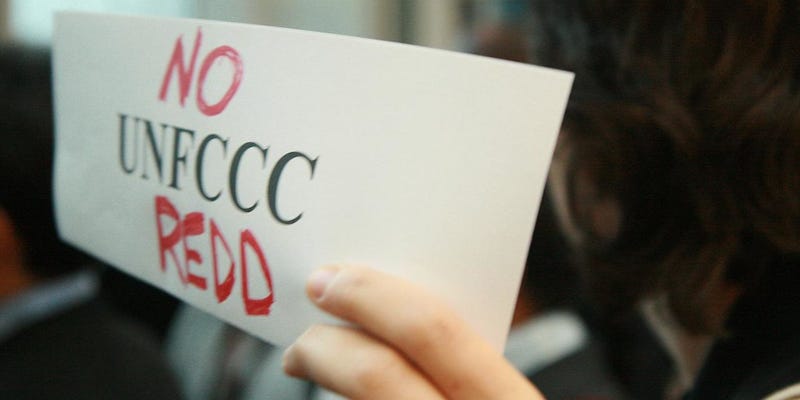REDD text is “insufficient and offensive”: Closing Statement of the International Indigenous Peoples’ Forum on Climate Change
In its statement on the final day of the COP in Poznan, the International Indigenous Peoples’ Forum on Climate Change repeated its demand “for an immediate suspension of all REDD initiatives and carbon market schemes. Cut emissions at source — No REDD.”
Closing Statement of the International Indigenous Peoples’ Forum on Climate Change
High Level Segment – 14th Conference of the Parties, Agenda Item 8 and CMP Agenda Item 9,
UN Framework Conference on Climate Change, Poznań, Poland
12 December 2008
Closing Statement of the International Indigenous Peoples’ Forum on Climate Change
Presented by Mr. Tom Goldtooth, Indigenous Environmental Network
Mr. Chair and Distinguished Delegates,The Shared Vision of this Climate Change Convention must observe and implement the UN Declaration on the Rights of Indigenous Peoples adopted by the UN General Assembly in 2007. As the UNFCCC is a process under the umbrella of the UN system, the denial of full and effective Indigenous peoples’ participation in the UNFCCC discussions is an affront to those rights granted only a year ago. It is urgent that the UNFCCC be amended as soon as possible to make its process and provisions consistent with the spirit and intent of the UN Declaration on the Rights of Indigenous Peoples and allow Indigenous peoples to express their views on all aspects of the Convention.
More specifically, language in the annex of the SBSTA 29, Agenda 5 document that merely mentions “full and effective participation of indigenous people (without the “s”)” is insufficient and offensive and creates a major obstacle for recognizing Indigenous Peoples’ rights in any REDD scheme. Can full and effective participation even exist if rights are denied? The omission of a concrete reference to Indigenous Peoples with an “s”, omission of the word, our rights and the UN Declaration on the Rights of Indigenous Peoples in the REDD document could cause gross and systematic human rights abuses including forced displacements. We recall the UN‐REDD Framework Programme that was launched by the UN Secretary General at the General Assembly’s 63rd Session acknowledges in its Framework Document that REDD could undermine Indigenous peoples and local communities’ rights to the usage and ownership of their lands and marginalize communal‐use rights. The International Indigenous Peoples Forum on Climate Change stand by our demand for an immediate suspension of all REDD initiatives and carbon market schemes. Cut emissions at source — No REDD.
Mr. Chair, as the Convention moves forward, we call to your attention the human rights violations caused by the Clean Development Mechanisms (CDM) and other carbon trading and carbon offset regimes. During this Convention you have witnessed growing concerns questioning the legitimacy of CDM. Any further expansion of the CDM is an excuse to avoid real emissions reductions. The CDM and the carbon market are instruments that commodify the atmosphere, promote privatization and concentrate resources in the hands of a few, taking away the rights of many to live with dignity. CDM are not a mechanism for mitigating climate change. It is not just “carbon” or pollution that is being traded, but people’s lives.
Our Indigenous brothers and sisters have traveled here from the four points of the world, in good faith and with a desire to share with world leaders our traditional knowledge towards developing a shared vision as we prepare for Copenhagen in 2009. We have repeatedly requested the Conference of the Parties here in the great city of Poznań to establish an Expert Group on Climate Change and Indigenous Peoples. If accepted by COP14, this will send a strong signal of the intent of this Conference process to include those peoples most under direct threat from climate change. The fate of more than a dozen small islands States, whose population is 90% indigenous and the reality of our brothers and sisters of the Arctic regions already hangs in balance.
The UNFCCC must set into action a new economic paradigm moving away from an unsustainable fossil fuel economy. We must transform the values of commerce and consumerism to those of conservation, cooperation and sharing. The acceleration of global warming means that, Annex 1 countries must reevaluate their Bali commitment in emissions reduction levels. Credible scientists and climate studies are now urging a reduction in greenhouse gas emissions by 80% by 2020, below 1990 levels, and a reduction of CO₂ atmospheric concentrations to 350 ppm in order to prevent the “tipping point”. Unless we stabilize energy use immediately, we face dire social and economic chaos. A growing number of analyses now suggest that far greater reductions at source accomplished within a much tighter time frame are needed. The climate crisis demands drastic international and national action, including implementation of self‐government and treaties negotiated between Indigenous Peoples and the states in which they reside.
We urge that all people of the world renew their understanding of their relationship with the sacredness of Mother Earth. Indigenous Peoples are prepared to renew their responsibilities, and we urge others to do the same. We will never have peace as long as we make war against Mother Earth.Mr. Chair and Governmental Delegates,
Thank you.



